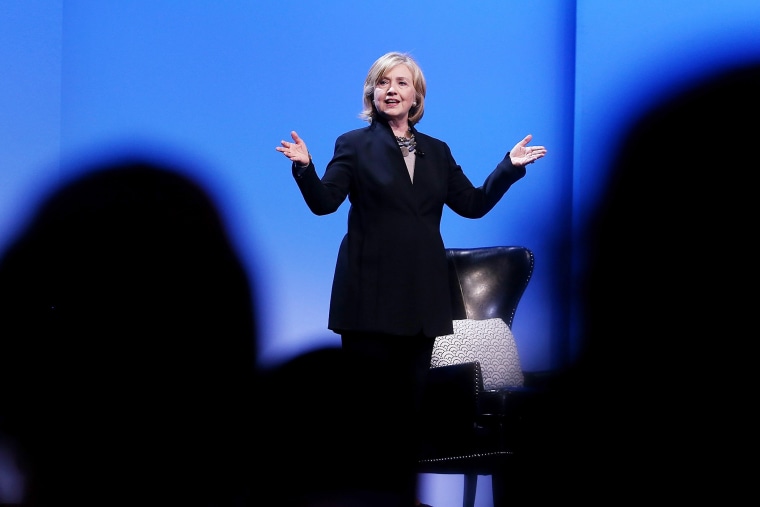Hillary Clinton, eyeing a second presidential bid and constantly at the center of intense press coverage, lamented Tuesday that modern media scrutiny has made it more difficult to be a leader today.
"We have created very difficult hurdles for people who want to serve, who believe they can lead, to do be able to do so. And the media has intensified that,” the former secretary of state said at the Dreamforce conference in San Francisco, sponsored by the tech company Salesforce.
Clinton said she had watched Ken Burns’ documentary on the Roosevelt family, noting that reporters kept hidden Franklin Delano Roosevelt’s handicap. Roosevelt was diagnosed with polio at age 39 in 1921 and was largely confined to a wheelchair as president.
“Instead of, in a democracy, doing what we should to be doing, which is giving people information so they can be decision makers,” Clinton said reporters today are only interested in "the best angle, quickest hit, the biggest embarrassment."
Klaus Schwab, the founder of the World Economic Forum in Davos, conducted the interview with Clinton.
“If you look at how much time used to be spent reporting the news, the real news, not analyzing it, but reporting it in the 1960s and 1970s compared to now, it’s dramatically shrunk,” she added.
In the 1960s there were three broadcast TV networks. Today, in addition to those networks, there are three 24-hour news channels (including msnbc), more local and cable channels, and a vast proliferation of online news outlets.
According to Pew, the number of hours of TV news coverage in 2014 grew 46% since 2003. In a separate study, the non-partisan research organization also found that that online outlets employ more than 5,000 full-time editorial staffers, and that 85% of those outlets were created since 2005.
Clinton has long had a difficult relationship with the press. When she first moved to the White House in 1993, after Bill Clinton became president, she ordered the corridor that gave reporters access to the West Wing to be blocked off, "effectively locking the world's most important (and self-important) press corps in the White House cellar," as Carl Bernstein wrote in his biography of Clinton. The decision was soon reversed.
During the 2008 presidential campaign, Clinton's aides and supporters often complained that she was subjected to endless media scrutiny while Barack Obama, her main rival for the Democratic nomination, was treated more gently. Later, after becoming Obama's top diplomat in his first administration, Clinton often praised the reporters who covered at the State Department, saying they were more interested in policy than the political scribes who scrutinized her in the White House and on the campaign trail.
In a his new book, journalist Matt Bai argues that the media started caring about politicians’ personal lives in 1987, when they revealed presidential candidate Gary Hart’s extramarital affair. That type of reporting would later play a major role in Clinton’s own life, when reporters uncovered her husband’s affair with a White House intern named Monica Lewinsky.
Critics have long debated the merits of reporters being complicit in what was essentially a White House cover-up of FDR’s disability.
Clinton didn’t only blame the media, however. She pointed structural trends that have impeded “problem-solving” in government.
She lamented the fact that fundraising now plays such a large part in lawmakers’ lives that they have little time left to get to know each other and broker deals. “Nobody’s around to actually spend time together to see what kind of human being I’m dealing with,” she said.
The Supreme Court contributed to the problem with its Citizens United decision, Clinton added. The 2010 decision unleashed a flood of cash into politics from corporations and wealthy individuals.
“The hamster wheel is going so fast, it’s hard to see how anyone even keeps up, let alone solve problems,” she said.
Schwab, who said he'd asked Clinton in the 1990s if a woman should be president, couldn’t help but ask again.
“I’ve known a lot of the women world leaders, presidents and prime ministers, and I do hope that the United states joins the ranks of those countries that have really overcome that hurdle to gender equality,” she replied.
“But it’s just a hypothetical. I don’t want to make any news today,” she added, laughing.
Clinton spent most of her prepared remarks describing the Clinton Foundation’s Too Small to Fail initiative, which works to build the language skills of low-income children.
But being a tech conference, she couldn’t but joke about social media. Noting that Salesforce CEO Marc Benioff’s shoes have their own Twitter account, Clinton asked, "What do you think, should I start @HillarysPantSuit?”
She also said the company’s mascot, “SaaSy,” is her favorite mascot name and added that she admired the conferences’ values of "Innovation, fun, and giving back.”
"We have a big fun deficit," she said.
Clinton has worked hard to court the exploding tech sector, visiting the campuses of Google, Facebook, and Twitter earlier this year. She praised the sector’s innovation Tuesday, but also warned that we have to make sure its benefits outweigh its “pitfalls.”
